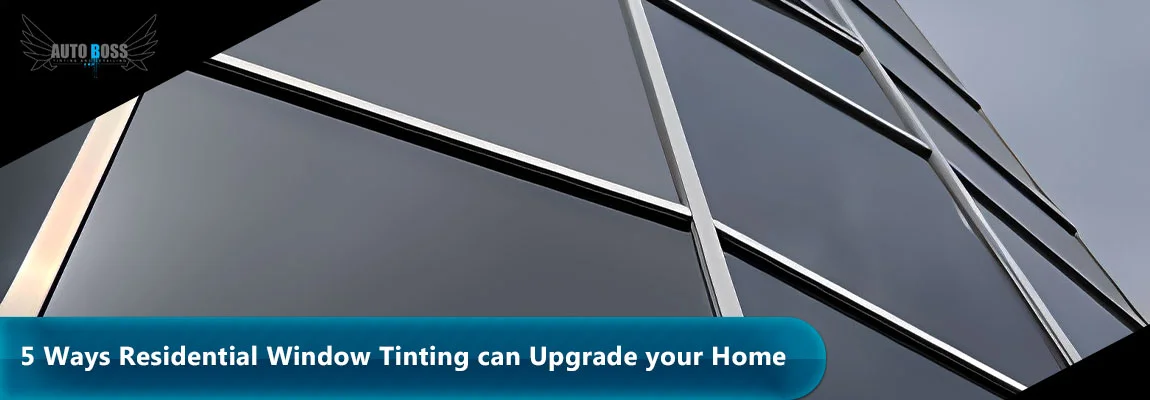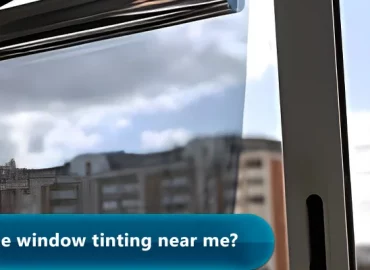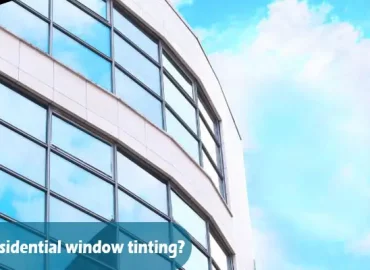Residential window tinting is becoming an increasingly popular option among homeowners for upgrading their homes. But shopping around for window tinting; can be much more complicated. With so many available options, choosing the best for your home can take time. Tinting your home windows involves adding a thin film, which can provide several benefits, such as privacy, UV protection, energy efficiency, and aesthetics.
This post will discuss five ways window tinting for homes can upgrade your home. But before that, let’s look at types of window tint for homes that you can use to upgrade your home.
There are several types of tinting options available for residential properties. Some of the most popular options include:
- Dyed Window Tint: Dyed tint involves adding a dye layer to the window’s surface. It’s an affordable option that can reduce glare, improve privacy, and block UV rays. However, it may be less effective at reducing heat than other types.
- Metallic Window Tint: Metallic tinting involves adding a metal layer to the window’s surface. It’s a more durable option that can reduce heat and block UV rays. But it can also interfere with radio signals and look reflective.
- Ceramic Window Tint: This type of tinting involves adding a layer of ceramic particles to the window’s surface. It’s the most expensive option but provides the most benefits. These include heat reduction, UV protection, and better clarity.
5 Ways Window Tinting can Upgrade your Home
Increased Privacy:
One of the significant advantages of home tinting is that it provides increased privacy. You can choose from lightly tinted to completely opaque options, giving you the level of privacy you desire. In addition, tinted windows prevent people from seeing into your home. It gives you peace of mind and a sense of security. Moreover, it is ideal for homes that are located window tinting near busy streets or densely populated areas. This way Privacy can be maintained easily.
Better Energy Efficiency:
Window tinting can help improve your home’s energy efficiency by reducing the amount of heat that enters through the windows. This can make maintaining a comfortable indoor temperature easier without overusing your HVAC system. Tinting results in lower energy bills and a reduced carbon footprint. In addition, by blocking the sun’s heat, window tinting can help keep your home cooler during the summer months. Additionally, it prevents heat loss during the winter months, making your home more comfortable and energy-efficient all year round.
Improved Comfort:
Window tinting can also enhance indoor comfort by blocking harmful UV rays that can make your home uncomfortable. By reducing glare and improving visibility, tinting makes watching TV or using electronic devices easier without straining your eyes. Moreover, it can also help reduce hot spots in the home. It makes it more comfortable to sit near windows without feeling the heat.
Protection for Your Interior:
Residential window tinting offers a significant advantage in protecting the interior of your home. The tinted film can block up to 99% of harmful UV rays, which can lead to fading and damage to your furniture, flooring, and other possessions over time. By installing window tinting, you can maintain the quality and longevity of your interior, safeguarding your investments and ensuring that your home looks beautiful for years to come. In addition, this added layer of protection can save you money in the long run, as you won’t have to replace or repair damaged items as frequently.
Aesthetic Upgrade:
Finally, window tinting can give your home a significant aesthetic upgrade. It provides a uniform appearance to the windows, enhancing the home’s overall look. You can choose from different tinting options that complement your home’s style and color scheme, improving its curb appeal. The film can reduce glare on the windows, giving them a sleek and polished look.
Related article: How much does it cost to make a commercial tint window?
Residential Window Tinting Pros and Cons:
While tinting for house windows provides several benefits, it’s essential to weigh the pros and cons before deciding on this upgrade is essential. Some of the pros include:
- Privacy: It can offer varying levels of privacy, depending on the type of tint used.
- Energy Efficiency: Tinting can help reduce heat gain, making it easier to maintain a comfortable indoor temperature and reduce energy bills.
- UV Protection: Tinting your home windows can block up to 99% of harmful UV rays, protecting your skin, furniture, and flooring from fading.
- Aesthetics: Also, it can enhance the look of your home by providing a uniform appearance to the windows.
However, there are also some cons to consider, such as the upfront cost of installation, potential interference with radio signals, and reduced visibility.
Residential Window Tinting Prices:
The cost of tinting can vary depending on the type of tint used, the size of the windows, and the complexity of the installation. On average, expect to pay between $5 to $10 per square foot of window tinting. While this may seem expensive upfront, it’s essential to consider the long-term benefits and potential energy savings.
Conclusion:
Residential window tinting is a practical and cost-effective way to upgrade your home. Whether you want increased privacy, better energy efficiency, improved comfort, protection for your interior, or an aesthetic upgrade, tinting your windows can provide it all.
With several options available, you can find one that suits your needs and preferences. Then, considering the long-term benefits and weighing the pros and cons, you can enhance your home’s value and comfort.
If you want to get your house windows tinted, Auto Boss Vaughan is here to help you. So contact us now, and let’s discuss how to upgrade your home.
647-554-BOSS(2677)




